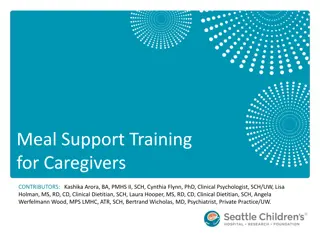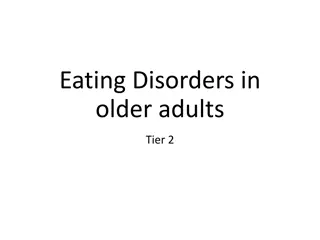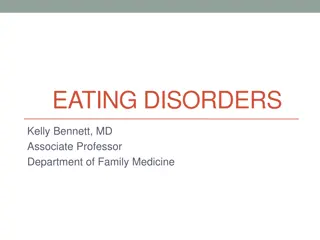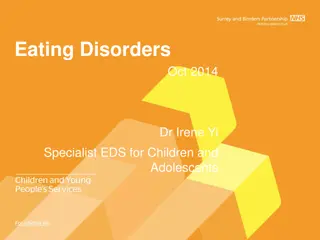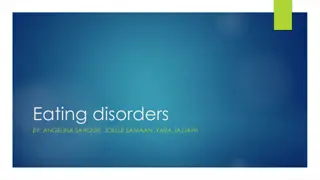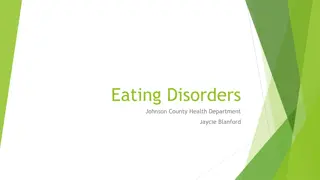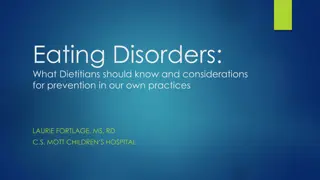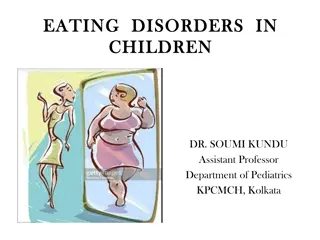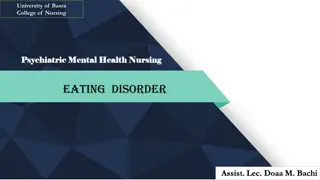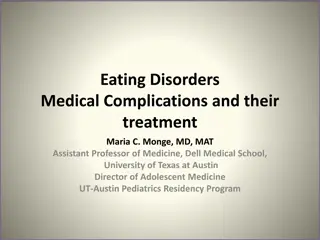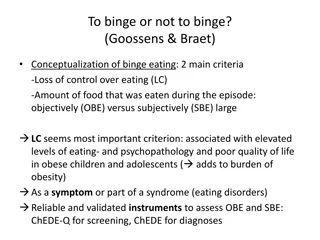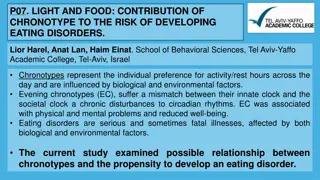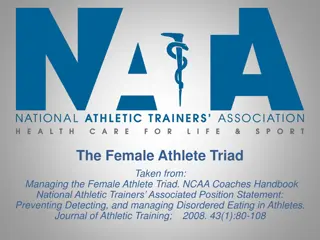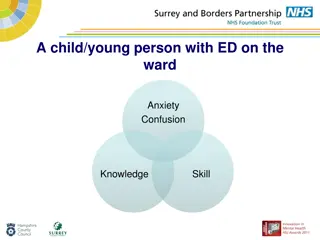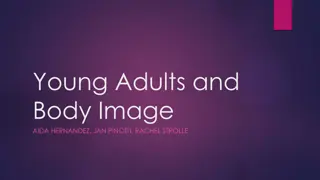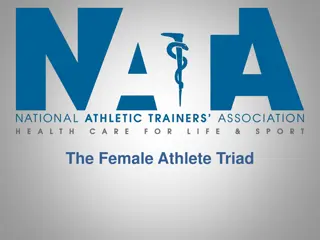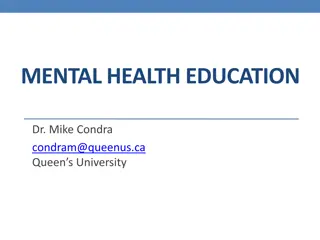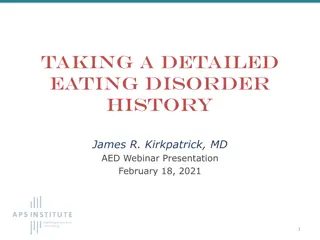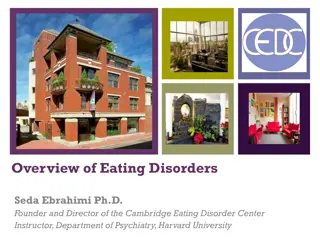Understanding Eating Disorders: Types, Signs, and Support
Eating disorders encompass unhealthy attitudes towards food and body image, affecting individuals' physical and mental well-being. Types such as anorexia nervosa, bulimia, binge eating disorder, and OSFED are discussed, along with the emotional aspects of these conditions. Recognizing signs, seeking help, and supporting loved ones are crucial in addressing eating disorders.
Download Presentation

Please find below an Image/Link to download the presentation.
The content on the website is provided AS IS for your information and personal use only. It may not be sold, licensed, or shared on other websites without obtaining consent from the author. Download presentation by click this link. If you encounter any issues during the download, it is possible that the publisher has removed the file from their server.
E N D
Presentation Transcript
iCan recognise a diet from disorder Tamsin Speight Specialist Eating Disorder Practitioner Yolanda Snyman Advanced Dietitian Community Adult Eating Disorder Service
iCan recognise a diet from disorder Aims of today What is an eating disorder? What are the signs of an eating disorder Healthy eating verses disordered eating Unhealthy exercise Social media Body image (Mental health foundation) Advise from people who have recovered How can I get help? What do I do if I think my friend or family has an eating disorder? 13.11.2019
What is an eating disorder? An eating disorder is when you have an unhealthy attitude to food, which can take over your life and make you ill. It can involve eating too much or too little, or becoming obsessed with your weight and body shape. https://www.nhs.uk/conditions/eating-disorders/ 13.11.2019
Types of eating disorders anorexia nervosa when you try to keep your weight as low as possible by not eating enough food, exercising too much, or both bulimia when you sometimes lose control and eat a lot of food in a very short amount of time (binging) and are then deliberately sick, use laxatives (medicine to help you poo), restrict what you eat, or do too much exercise to try to stop yourself gaining weight binge eating disorder (BED) when you regularly lose control of your eating, eat large portions of food all at once until you feel uncomfortably full, and are then often upset or guilty other specified feeding or eating disorder (OSFED) when your symptoms do not exactly match those of anorexia, bulimia or binge eating disorder, but it does not mean it's a less serious illness 13.11.2019
Eating disorders arent all about food People with eating disorders often feel a lot of pain, sadness and worry. The eating disorder can be a way to cope https://www.youtube.com/watch?v=IaHvtMtm-Jc 13.11.2019
Who is at risk? Anyone can develop an eating disorder; male, female, any age, background and culture Girls and young women aged 12-20 are at especially high risk https://www.beateatingdisorders.org.uk/get- involved/campaign/previous/eating-disorders-university 13.11.2019
Who is at risk? What predicts someone developing an eating disorder? Body dissatisfaction People who have dieted People exposed to weight talk Professor Dianne Neumark-Sztainer https://soundcloud.com/appearance-matters/ep-23-eating-disorder- prevention 13.11.2019
Who is at risk? Emerging adulthood Developmental period from roughly age 18 to 25 years. Five key characteristics of emerging adulthood include: 1. Identity exploration 2. Instability 3. Self-focus 4. Feeling in between 5. Emerging adults with eating disorders may need help navigating major transitions in their lives (e.g., in education, work, living circumstances, relationships) and to form an identity and adult life separate to their eating disorder. Possibilities https://freedfromed.co.uk/science-and-research-behind-freed 13.11.2019
Eating Disorders at University Starting university can be a huge change; leaving home, making new friends, financial and academic challenges. For vulnerable people or those suffering from an eating disorder, it can be a particularly difficult time. There is a relatively high prevalence of eating disorders in student populations... Eating disorders such as anorexia nervosa and bulimia nervosa are widely recognised in the student population. Royal College of Psychiatrists (2011), Mental health of students in higher education. 13.11.2019
What are the signs of an eating disorder? 13.11.2019
What are the signs of an eating disorder? spending a lot of time worrying about your weight and body shape avoiding socialising when you think food will be involved eating very little food deliberately making yourself sick or taking laxatives after you eat exercising too much having very strict habits or routines around food changes in your mood 13.11.2019
What are the signs of an eating disorder? You may also notice physical signs, including: feeling cold, tired or dizzy problems with your digestion your weight being very high or very low for someone of your age and height not getting your period for women and girls 13.11.2019
Short series of animated films: The physical and emotional effects of eating disorders http://www.cardiffandvaleuhb.wales.nhs.uk/page/84772 13.11.2019
Healthy eating vs. Disordered Eating Diets are often marketed as the answer to people s problems If diets really work why do we need so many Dieting industry multi-billion dollar industry that succeeds by making people feel bad about themselves People become stuck in a vicious cycle of dieting Strict Dieting Eat more than planned/ binge Deprivation physical & psychological 13/11/2019 14
Healthy eating vs. Disordered Eating Different types of diets Constantly following weight reducing (WR) diets can contribute to significant weight gain in the long-term Most WR diets prescribe far too little food When we don t eat enough our body tips into semi- starvation state induces physical deprivation Diet language good , bad , cheat and guilt lead to strict and rigid rules around eating (not guidelines) 14/09/2024 15
Healthy eating vs. Disordered Eating For example: I try not to eat too many sugary foods vs. I must never eat sugar at all Therefore the rule is either followed or broken so our actions can only be right or wrong We perceive this as success or failure This can exacerbate feelings of low mood and low self- esteem This can lead to either overeating or restricting 13/11/2019 16
Healthy eating vs. Disordered Eating People may engage in disordered eating for many years without really being aware Discuss examples Therefore it s difficult to know what normal, balanced, non- disordered eating looks like Key components for normal eating: Regularity, Variety, Flexibility and Fun Regular eating! Very important to overcome an ED http://www.cardiffandvaleuhb.wales.nhs.uk/page/84772 How much do we need? CHO 50-60% Protein 10-20% Fats 30% 13/11/2019 17
Healthy eating vs. Disordered Eating Why do we eat? Flexibility and FUN! The Food for Thought Dinner plate Eating during treatment for and Eating Disorder may look different from average person following a normal/healthy diet Vigilant with timings More planning and preparation Eating far more than normally required Later eating will become more flexible and intuitive 13/11/2019 20
Unhealthy Exercise Exercise or movement is an important part healthy living There are three key points to consider when assessing whether exercise behaviours and beliefs are helping or harming our health Exercise/movement must: Rejuvenate the body, not exhaust or deplete it; Increase mind-body connection, not allow or induce disconnection; and Alleviate mental and physical stress, not produce more stress Unhealthy exercise (or movement) describes exercise behaviours, thoughts, motives and intentions that degrade, rather than support, our various aspects of wellbeing. These aspects include, our physical, emotional, social, intellectual, occupational, spiritual, environmental and financial wellbeing. Maintaining factor of an ED 13.11.2019
Unhealthy Exercise If you experience any of the symptoms below, you may be exercising at a level that is not healthy for your wellbeing Overexercising (exercising to the point of creating physical, emotional, occupational, intellectual, social, spiritual, environmental or financial harm, even if the exercise does not appear to be excessive in frequency, duration, type or intensity Exercising in secret, and engaging in rigid/repetitive or punitive exercise Exercise that is directly related to the ED (e.g. calorie compensation, body image dissatisfaction) Exercise when also engaging in purging behaviours (e.g. self-induced vomiting or laxative misuse) Exercising when ill or injured Experiencing guilt, anxiety and low mood in relation to lack of exercise Exercise that interrupts daily life, or when excessive time is spent thinking about exercise Perceived inability to change exercise session or introduce anything new 13.11.2019
Unhealthy Exercise Unhealthy exercise can lead to serious health effects, including cardiovascular damage, bone damage, reproductive issues, relapse/delayed recovery Takes time away from family/friends, work, study or other important areas in one s life Healthy exercise recommendations are 150 min of moderate aerobic exercise per week (e.g. 30 min x 5) or 75 min of vigorous aerobic activity or a combination of the two Strength training exercises for all major muscle groups at least twice per week. Aim to do a single set of each exercise, using a weight or resistance level heavy enough to tire your muscles after about 12 to 15 repetitions Note: if you have recently or in the presence of exercise only) experienced heart palpitations, chest pain, dizziness, fainting, light- headedness, or you are using compensatory methods to purge calories, it is important to consult your GP prior to engaging in any form of exercise 13.11.2019
Social Media and Apps - Friends or Foes? People struggling with an eating disorder will judge themselves in terms of their shape, weight and their control This often results in constant striving towards a particular ideal-social media provides limitless ways in which to gather information which reinforces the sense of importance of this Social media can make it seem as if everyone in the world is doing more exercise than you, fits into smaller clothes than you, has a more toned body than you or eats less than you You can be left thinking everyone has a more interesting, exciting fun-filled sociable life than you do. Often this information is misleading https://freedfromed.co.uk/img/guides/Social_Media_And_Apps-FREED.pdf 13.11.2019
Health apps Do you use an app to record your dietary intake and/or activity levels? What impact do you think this has on how you feel each day? 13.11.2019
Health apps Experiment For one day monitor how much time you spend on your app. How much of your day is taken up with checking or adding information to it rather than spending time doing activities you enjoy? Notice the effect on your mood, anxiety and self- esteem of using your app Try taking a break for an hour, a half day or a full day. Did you feel better or worse when not using your app? 13.11.2019
The camera never lies- except on social media! Today s technology means the images people post of themselves on social media are highly selective, often altered or put through filters. 13.11.2019
What apps? In a recent report by Ofcom, in the last ten years the amount of people who now own a smartphone in the UK has risen from seventeen to seventy-eight percent. This number is even higher in younger adults with ninety five percent of eighteen to twenty-four year olds possessing one. Ofcom also found that we spend, on average, two hours and twenty-eight minutes a day with seventy- two percent of us reporting our smartphone to be the most important gadget and seventy eight percent even admitting we couldn t live without it! The report suggests that having a smartphone has taken over people s lives in both good and bad ways. So what apps doe we use? https://www.nhs.uk/apps-library/ 13.11.2019
Body image Body image can be defined as the picture someone has in their mind about the appearance (i.e. size and shape) of their body, and the attitude that they form towards the characteristics of their body. 13.11.2019
Negative body image Negative body image (or body dissatisfaction) involves feelings of shame, anxiety, and self- consciousness. People who experience high levels of body dissatisfaction feel their bodies are flawed in comparison to others Can lead to feelings of depression, isolation, low self-esteem, and eating disorders 13.11.2019
Positive body image Positive body image is a clear, true perception of your shape; seeing the various parts of your body as they really are. Body positivity (or body satisfaction) involves feeling comfortable and confident in your body, accepting your natural body shape and size, and recognizing that physical appearance say very little about one s character and value as a person https://www.nationaleatingdisorders.org/body-image-eating-disorders 13.11.2019
Tips for a positive body image Appreciate all that your body can do Ask yourself; Does your shape and weight define you as a person? What other qualities and values do you live up to? What is more important in your life? Look at yourself as a whole person (not just your shape and weight). Avoid fat talk Strike a balance between shape and weight checking Wear clothes that are comfortable and that make you feel good about your body. Read Dieting and the search for the perfect body by Kelly Brownell (1991). 13.11.2019
What if I am over- weight? https://positivepsychology.com/positive-body- image/ 13.11.2019
Healthy Body Image Body positivity movement https://youtu.be/6tTmYmc6ubE https://www.mentalhealth.org.uk/campaigns/mental -health-awareness-week/body-image-poem 13.11.2019
Why get help? After three years, eating disorder symptoms tend to become hard wired in the brain. Symptoms can still be changed, but it gets harder to make changes and there may be long-lasting consequences https://freedfromed.co.uk/what-is-freed-for-professionals 13.11.2019
On-line help/advice www.b-eat.co.uk https://www.nationaleatingdisorders.org/ https://www.aedweb.org/home (USA) https://thebutterflyfoundation.org.au/ (Australia) https://freedfromed.co.uk/ 13.11.2019
Diet or Disorder A free Bilingual App designed for those who are concerned they may have an eating disorder and for people who care. Download on iTunes https://appsto.re/gb/a-vXib.i Google Play Store https://play.google.com/store/ apps/details?id=uk.co.rollerage ncy.swansea&hl=en 13.11.2019
Self-help On-line Self help https://www.cci.health.wa.gov.au/Resources/Looking-After-Yourself/Disordered-Eating 13.11.2019
Help for students https://www.beateatingdisorders.org.uk/owl The Owl group is a confidential, inclusive and welcoming space for students with an eating disorder. You re invited to share experiences with others in similar situations and can attend as often as you like with no pressure to attend every time. The Owl group runs on Tuesdays from 7:00pm to 8:15pm. 13.11.2019
Getting help Talk to the student counselling service /mental health advisor Go and see your GP 13.11.2019
Advise from the recovered https://soundcloud.com/appearance-matters/ep-23-eating-disorder-prevention The aim of NOT PLANT BASED is to create and source honest, non- patronising advice, reviews and stories to aid those who are prone to unhealthy eating and/or fitness habits which have a negative effect on their health and how they view themselves. NOT PLANT BASED was founded by Laura Dennison and is co- authored by Eve Simmons, both of whom have suffered with eating disorders. We are telling our stories to help others who have also suffered, or are continuing to, with troubled eating 13.11.2019
What if I am worried about someone? Often people with eating disorders deny or don t realise there s a problem, but that doesn t mean they re not ill. Eating disorders thrive on secrecy, and countless people who are in recovery agree that breaking the silence is the right thing to do, even if they didn t feel that way at the time. The sooner someone can get treatment, the greater their chance of a full and sustained recovery. https://www.beateatingdisorders.org.uk/recovery-information/worried-about-friend 13.11.2019
What do I say? Think about what you want to say Choose a place where you both feel safe and won t be disturbed. Choose a time when neither of you feels angry or upset. Avoid any time just before or after meals. Have some information with you Try not to centre the conversation around food and/or weight, ask how they re feeling. Mention things that have concerned you 13.11.2019
What do I say? Try not to use language that could feel accusatory. I wondered if you d like to talk about how you re feeling is a gentler approach than You need to get help They may be angry and defensive. Try to avoid getting angry in response, your concern is their wellbeing. Don t wait too long before approaching them again. If they acknowledge that they need help, encourage them to seek it as quickly as possible. Offer to go with them to the GP if they would find that helpful. If they tell you there s nothing wrong, even if they seem convincing, keep an eye on them and keep in mind that they may be ill even if they don t realise it. https://www.beateatingdisorders.org.uk/recovery-information/worried-about-friend 13.11.2019


